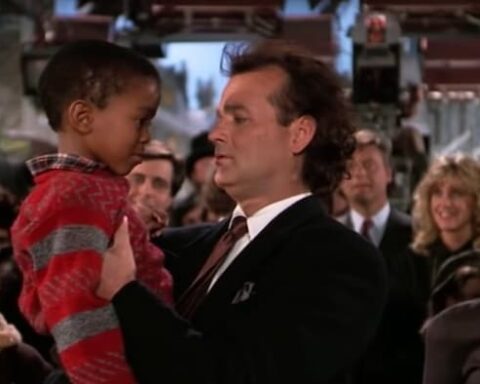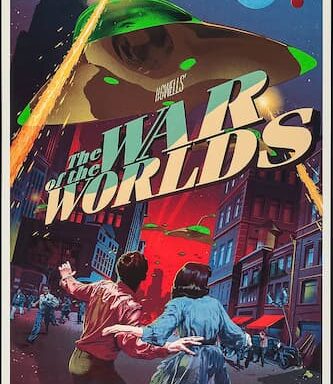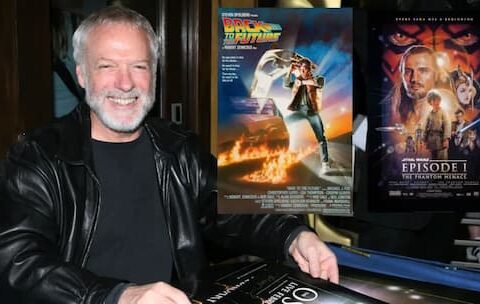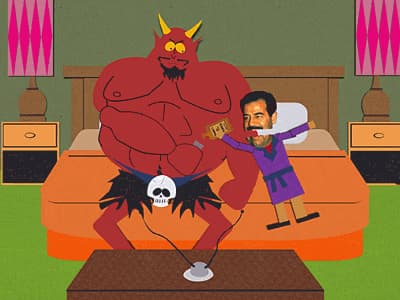With the classic Monty Python line-up being talked about a fair bit recently, having performed their final ever stage appearance this week, I am prompted to reflect on how great, how groundbreaking, how genuinely funny, the beloved crew of trail-blazing, cutting-edge comedy writers and actors have been.
Moreover I am prompted to wax lyrical over what I still consider to be the funniest film ever made – Monty Python & The Holy Grail.
Last Sunday night, on stage at London’s O2 Arena and also playing to more than 2,000 cinemas around the world, the surviving members of the legendary Monty Python performed for what they insist will be the last ever time together. The final show of their headline-garnering farewell tour also featured appearances from Mike Myers and the more modern British comedy genius who’s been long referred to famously as “the seventh Python”, Eddie Izzard.
The London show ended fittingly with a rendition of ‘Always Look On The Bright Side of Life’ (what else?). It’s been reported that audiences have particularly applauded during archive footage included of the late Graham Chapman, who died of cancer in 1989.
Chapman is of course central to The Holy Grail movie in particular. It’s hard to fathom that the movie is almost 40 years old at this point; but it was already 20 years old when I was first watching it as a kid. While The Life of Brian seems to be the more elevated film, frequently voted the best comedy film of all-time in polls, it has always been The Holy Grail that I’ve considered Monty Python’s best work (though more recently The Holy Grail was selected second best comedy of all-time in an ABC poll, while polls in Total Film in the UK and Channel 4 had it as the fifth and sixth greatest comedy of all-time respectively).
Of course The Life of Brian is superb; and the other Monty Python movie ‘The Meaning Of Life’ has its terrific gags too (not to mention one particularly memorable Eric Idle musical number). But The Holy Grail is from beginning to end an absolute showcase of everything that makes Monty Python so brilliant; an undiluted masterclass in very British comedy and an utterly addictive shambles of a film, complete with all the usual crude animated interludes and non-sequiturs and every other hallmark of Pythonism.
Even now I laugh every time I think of the film’s running gag of characters miming riding on horses while someone bangs two coconuts together for the sound effect. It was funny anyway; but it’s even more funny now that I know this wasn’t just a creative decision for comedy effect, but that the film’s limited budget made real horses too expensive. They say necessity is the mother of invention, and the Monty Python crew turned a financial shortcoming into the film’s most effective comedy element. Brilliant.
It was also the late Graham Chapman’s best performance as far as the three films go; while he had a more squarely central role in Life of Brian, his turn as King Arthur is just perfectly, perfectly measured and unforgettable.
I can’t think of Chapman in general without thinking of his straight-man, humourless face throughout The Holy Grail – how he didn’t burst into laughter and ruin every take is a mystery. But Chapman is the steady rock around which the surrounding mayhem and silliness revolves, and without him and that perfect central performance none of the rest of it would’ve worked.
All the Pythons are at their best in this film, for that matter; Eric Idle, Terry Gilliam, Michael Palin, Terry Jones and John Cleese, filling out the farcical Arthurian landscape with perfectly realised caricatures. John Cleese as the “Quite Extraordinarily Rude Frenchman” is comic gold (“Now go away or I shall taunt you a second time!”); but every one of them has their terrific moments and characters across the movie, and much more so, I’d suggest, than in The Life of Brian.
The classic comic moments are too many to mention; from the bloody duel with the Black Knight and the Tale of Sir Robin the Not-Quite-So-Brave-as-Sir Lancelot to Tim the Enchanter and the Knights Who Say ‘Ni’, with the Oppressed Peasants, the Bridge of Death, and the “Holy Hand-Grenade of Antioch” and everything else in-between; The Holy Grail hits the mark from start to finish, never dipping in quality.
It’s also interesting, as with a lot of things, to contrast what you found funny as a child to what you find funny as an adult.
In terms of The Holy Grail, when I was a kid I used to piss myself at the duel with John Cleese’s Black Knight, as he is sequentially deprived of each key body part until all that’s left of him is a torso spewing blood and still he refuses to admit defeat. But as a grown-up it’s no longer the visual gags or sillier sketches I laugh at, but the dialogue and the knowing, measured delivery; Chapman and Cleese in particular have their delivery so spot-on in numerous scenes (“I fart in your general direction!” doesn’t work unless it’s perfectly delivered by John Cleese in a French accent).
It is anarchic, surrealist, silly comedy at its very best.
A great, early example;
King Arthur: I am your king.
Peasant Woman: Well, I didn’t vote for you.
King Arthur: You don’t vote for kings.
Peasant Woman: Well, how’d you become king then?
[Angelic music plays… ]
King Arthur: The Lady of the Lake, her arm clad in the purest shimmering samite, held aloft Excalibur from the bosom of the water, signifying by divine providence that I, Arthur, was to carry Excalibur. That is why I am your king.
Dennis the Peasant: Listen. Strange women lying in ponds distributing swords is no basis for a system of government. Supreme executive power derives from a mandate from the masses, not from some farcical aquatic ceremony.
Arthur [self-conscious]: Be quiet!
Although I’m generally a Python fan anyway, it has to be said that the actual TV series Monty Python’s Flying Circus is a hit-or-miss affair, with some moments of comic genius but plenty of sketches that fall a little flat. But we look at it now a number of decades removed from its time; it’s easy to forget just how much of an impact the Python’s style of anarchic, shambolic comedy made in the nineteen seventies and how much it influenced most of the best comedy in the years and decades that followed (from The Young Ones and Blackadder to The Mighty Boosh; and that’s just the tip of the iceberg).
Those men were a revelation in comedy and are rightly celebrated as both geniuses and pioneers all this time later.
And Monty Python’s The Holy Grail remains, in my opinion, their absolute crowning achievement – a gloriously imperfect work of perfection. And the funniest film, by some distance, that’s ever been created.
It’s just impossible to imagine any film ever being as funny, or as endearing at the same time, as this; quite simply because that moment in time and those specific creative forces working in collaboration with each other will never exist again.
And lucky for me (being painfully slow to catch up with things in general) I still have the DVD experience to look forward to at some point. The Special Edition DVD released in 2001 includes two commentary tracks (Idle, Cleese and Palin on the first, with Jones and Gilliam on the second), as well “Subtitles For People Who Don’t Like the Film”, consisting of lines taken from William Shakespeare’s Henry IV, Part 2, and a feature for the hard of hearing, in which the DVD menu is read by Terry Jones in a very loud voice.
Something to look forward to.




